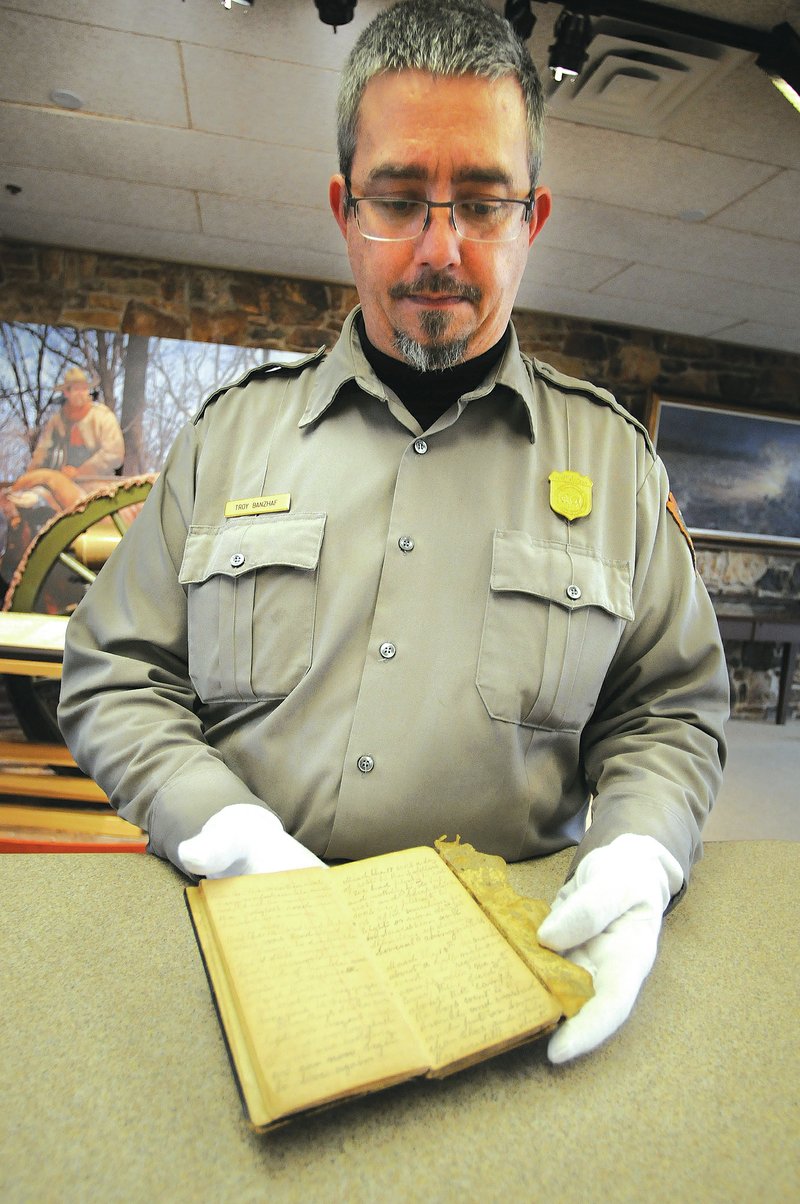PEA RIDGE -- It was cold as William Vaughan marched toward Pea Ridge in March 1862, days before the battle there.
Vaughan, a private with the Seventh Division of the Missouri State Guard, was called out March 3 to begin marching at daylight from Cove Creek.
Web Watch
http://shs.umsystem…">The State Historical Society of Missouri has a scanned copy of William Vaughan’s 1961-1862 diary.
Source: Staff Report
The Missouri State Guard was a Missouri militia group that supported the Confederate cause, said Troy Banzhaf, park ranger at Pea Ridge National Military Park. The Battle of Pea Ridge kept Missouri in the Union after Confederate forces lost, he said. Missouri was a slave state.
Vaughan's diary from December 1861 to 1862 recently was donated to the park.
Spirits were high as the troops set out for the battle, Vaughan wrote.
"It does seem that every soldier is churned up and feels foolishly assured of a great victory. Yes our liberty is at stake," he wrote as the troops started their march.
"We must conquer or die."
Vaughan did not die, but he kept a diary through the Civil War, later becoming a chaplain, according to an inscription from his daughter Lucy Vaughan in his diary from 1861 and 1862.
The diary is one of three owned by the park that includes an account of the Battle of Pea Ridge, Banzhaf said.
Having an original writing about the battle gives a firsthand perspective of what life was like in the Civil War, Banzhaf said. A display highlighting the diary will be prepared this spring. The Springfield-Greene County Library keeps many records at www.OzarksCivilWar.org and the battlefield may partner with them later, Banzhaf said.
Vaughan wrote about his homesickness, playing marbles to pass the time and about his first encounter with an iron horse -- a train -- in Memphis. The sound and the flying sparks startled him. One day he got in a fight with another man and spent the day under guard. One march they missed the Battle of Corinth, but marched hard, Vaughan wrote. They stopped in a wooded area.
"Now to tell the truth the hill was so steep that I had to drive my bayonet in the ground at my feet to keep from sliding down the hill while I was sleeping," he wrote.
A good meal was a spread with biscuits and eggs, molasses, rice, bread, beef and coffee. During one march he was barefoot in the mud.
Those experiences were common for soldiers in the Trans-Mississippi Theater, Banzhaf said.
Soldiers drilled, fell sick and moved from place to place. Vaughan wrote he marched 415 miles during the time he had the diary.
"Some of these guys would have been in three or four battles in four years," Banzhaf said.
"It wasn't all glory," he said.
The Napoleonic tactic of lining up two opposing forces and marching them across open ground was abandoned during the Civil War, he said.
Vaughan's diary is the only Confederate account the park has, Banzhaf said.
His account starts March 3, 1862, being marched out of Cove Creek. On March 4 he thought he was marching toward his home and Springfield, Mo. The troops camped within a mile of Fayetteville that night after walking 17 miles. The men had no bedding for camp when they stopped near Elm Springs on March 5, and it was cold. They found Union troops near Bentonville on March 6 and chased them noon to night, the Union troops leaving behind charred buildings. Eight miles beyond Bentonville they stopped to eat. Then they stopped at Pea Ridge to rest.
The next day, March 7, 1862, started the Battle of Pea Ridge.
"We found them at Elk Horn Tavern," Vaughn wrote. "The engagement commenced about 11 o'clock in the morning. All seemed to be going on right. Our boys would run them from one joint to another and the air would be filled with the loud shouts of Southern boys. I never felt more assured of any thing than I did of a victory. I never got into a close engagement until last in the evening and then we ran the enemy as long as day light would let us. It seemed that every man of the company that I belonged to, that is to say all of Cap. Green's company, stood right up to the music. Only two was wounded and those not badly. We then took our stand for the night. We must now lay out all night without any beer or bedding or any thing to eat. We must suffer. We did suffer but one thing rolled over our minds. Our liberty is at stake."
The next day the battle started at sunrise. Only two men in his company were injured and not badly. Vaughan wrote he was surprised by the retreat.
"Never did soldiers have a worse time than we did from the 8 to the 16. The weather was very unfavorable and we had to march over the roughest road ever traveled by a army," he wrote.
There were probably other battles and other diaries, Banzhaf said. Family members who donated the diary said they did not have any history to add to its contents.
The thin leather book donated to the battlefield probably isn't the only of its kind. Many people have historical artifacts and do not realize their value, Banzhaf said.
The Vaughan account is valuable because they know who wrote it, Banzhaf said. Each account allows historians to learn something new, a new piece of the puzzle.
Amye Buckley can be reached by email at [email protected] or on Twitter at @NWAAmye.
NW News on 01/12/2015


